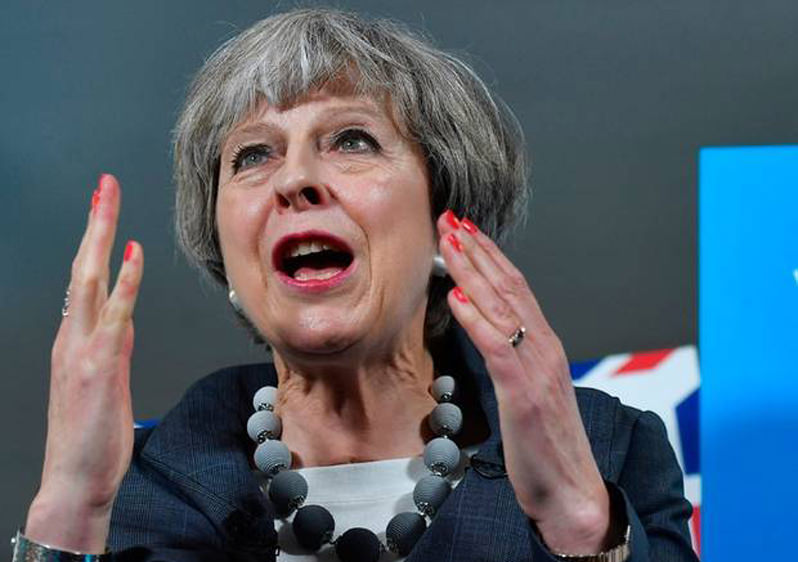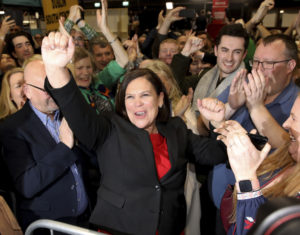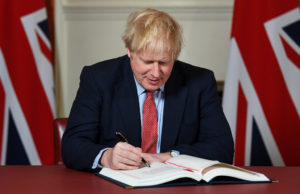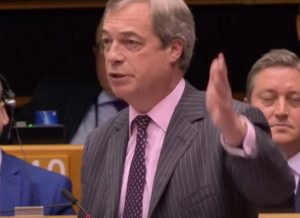Take Heart, Progressives: Theresa May Is Putting a Nail in the Coffin of the U.K. Right Wing
As Bernie Sanders framed it in his congratulatory message to Labour leader Jeremy Corbyn after Thursday’s snap election, the war against “austerity and inequality” is only beginning. U.K. Prime Minister Theresa May. (Tiocfaidh ár lá 1916 / CC BY-ND 2.0)
U.K. Prime Minister Theresa May. (Tiocfaidh ár lá 1916 / CC BY-ND 2.0)
Natasha Hakimi Zapata reports for Truthdig from London.
What a relief it was to wake up Friday to news signaling that the hard-right march the West has been on for decades is being met with undeniable resistance.
I’m talking about the United Kingdom’s general election, of course, in which the Labour Party, under Jeremy Corbyn’s progressive leadership, made important gains.
Those who point out that the Tories are still the largest party in a hung Parliament are completely missing the point, as is conservative leader Theresa May, as she clings to power whichever way she can, seemingly deaf to the message her own people sent her during the snap election Thursday.
Seven or so weeks ago, after months of insisting she wouldn’t call a snap election before the five-year term she won from her predecessor was up, May did just that. The unelected prime minister had surely been looking at polls that suggested she was a comfortable 20 points ahead of Corbyn, who’d been maligned by media and even members of his own party since he was chosen as Labour’s leader in 2015. And so May decided to “strengthen her mandate” (read: do whatever she and her right-wing buddies damn well please) for the upcoming Brexit negotiations by asking the people of Britain to hand her more than the razor-thin majority she was working with in Parliament.
What followed were seven weeks of May essentially hiding behind the word “Brexit” and refusing to debate other party leaders on television, during a period in which two terrible attacks took place in major U.K. cities. But while May and the rest of the Tories thought they could win this election by shoring up more resentment toward the European Union and further stirring anti-immigrant sentiment, Corbyn decided to do quite the opposite. And amazingly, it worked.
Brexit, my English partner Richard tells me, was never really about the EU, regardless of what the pundits and politicians wanted everyone to believe. It was, as journalist Vincent Bevins wrote last year, the only tool handed to a rightfully disgruntled people to express their anger over a political system run by elites that has actively left them behind over the past several decades. Labour itself turned its back on the working classes under Tony Blair’s leadership, becoming “Conservative lite,” as Richard likes to call it, until Corbyn stepped up and sent shock waves through the establishment.
Corbyn has been in Parliament since 1983, but he’s been on the streets of the U.K. since before then, protesting injustices ranging from South African apartheid to the Iraq War and the National Health Service’s junior doctors’ salary cuts. Unlike many of his colleagues in power, he’s been listening to the people he represents, a tendency that has kept him on the right side of history for decades. I have been at several events and rallies where Corbyn has spoken, and I can tell you that this is a man that no one should have underestimated.
The establishment’s insistence on not taking the Labour leader seriously is his not-so-secret secret weapon. After winning two leadership contests while many in his own party repudiated him and the right-wing media continued to denounce him as a “terrorist sympathizer,” Corbyn understood what it took to win over voters as an underdog, and this snap election gave him another chance to prove it.
American anthropologist David Graeber has written convincingly about those who have feared Corbyn’s rise all along:
If the opposition to Jeremy Corbyn … has been so fierce, and so bitter, it is because his existence as head of a major political party is an assault on the very notion that politics should be primarily about the personal qualities of politicians. It’s an attempt to change the rules of the game, and those who object most violently to the Labour leadership are precisely those who would lose the most personal power were it to be successful: sitting politicians and political commentators. …
The real concern … among the Labour establishment [is the] fear [of] being made truly accountable to those they represent. … [and] insofar as politics is a game of personalities, of scandals, foibles and acts of “leadership”, political journalists are not just the referees – in a real sense they are the field on which the game is played. Democratisation would turn them into reporters once again, in much the same way as it would turn politicians into representatives.
As other politicians went through the motions of meaningless sound bites, fearmongering and fundraising they’ve become accustomed to in place of actually campaigning, Corbyn went back to doing what he arguably does best: He listened to the pain of the people. The Labour Party put out its most left-wing manifesto in more than 30 years, proposing a taxation plan that would quite literally take from the rich to give to the poor—taxing corporations and the U.K.’s highest earners to pay for social programs that include abolishing university tuition fees and boosting investment in the ailing NHS.
May’s party manifesto, on the other hand, proposed what became known as a “dementia tax,” a plan that would have the elderly who require home care pay for it posthumously with their property assets. But don’t think about that, the prime minister seemed to say; we need to focus on Brexit, Brexit, Brexit. That’s what this election was called for, after all.
When tragedy hit in the form of attacks on Manchester and London in the weeks before Thursday’s election, May promised to literally slash human rights in order to fight terrorism as well as increase controls on the internet. Corbyn, on the other hand, focused on failed policies passed while May was home secretary: crippling cuts to the police budget that left 20,000 cops without a job and “the connections between wars our government has supported or fought in other countries, such as Libya, and terrorism here at home.” He refused to move right on foreign policy and immigration issues as his Labour predecessors had, finally putting to bed the tired argument that the left can only win elections by appealing to xenophobic sentiments in the center.
Regarding May’s awful comments on human rights, a Romanian friend told me, “Why does this surprise you? She’s been infringing on our human rights for years now.” Like myself, in order to stay in the U.K., this friend has been grappling with the increasingly draconian immigration laws May passed while home secretary. Hoops such as strict and arbitrary income requirements placed on British family members—barriers Tories promised in their recent manifesto to raise higher—have literally torn families apart. This piece in the New Statesman lists just six examples of how xenophobic British immigration laws have kept partners apart and even parents from their children. With laws that emphasize income as a requirement for allowing people to bring their loved ones to the U.K., it seems only the wealthiest of Brits are allowed to fall in love and live with non-EU citizens in their own home country.
In the aftermath of the election, some conservatives tried to make sense of the vote, especially the high turnout among the young voters, by implying that the young were swayed by the idea of tuition fees being eliminated, again missing the larger issues at stake. Turns out my generation will not be blinded by numbers and bottom lines thrown at us like warning labels on a medicine called “socialism.” Many of my peers in the U.S. and U.K. pursued educations, only to subsequently drown in student debt and be thrown into job markets in crisis, where we’re consistently mistreated and underpaid. Socialist ideals promise health care, education, workers’ rights and yes, general protections of those pesky human rights to all members of society, regardless of class, race or gender. If anything is a recipe for mass appeal to young people struggling in a society that increasingly undermines these goals, it is this.
On Friday, I couldn’t help but smile as I parsed the numbers showing that Corbyn’s appeal had increased the Labour vote by the largest percentage since 1945 and saw that even constituencies such as the wealthy Kensington district of London, and Canterbury, which has never in the history of British politics voted Labour, had turned red — the Labour Party’s color — on the voting map. The results were called a shock, but as someone who’s been following the trajectory of Corbyn’s leadership, I was more smug than surprised. At those rallies where he’d spoken, I had looked around the room and seen what the media and parliamentarians had willfully ignored: diversity. In attendance with Corbyn were people of all races, classes, ages and gender identifications. Like Bernie Sanders in the U.S., who supported Corbyn during his recent campaign, the Labour leader cut across these demographics to offer a message of hope for a better future.
Since the election I’ve asked Richard the same question every morning as soon as I wake up: Has Theresa May resigned yet? The answer has been a disappointing no, but I’m not worried, and other progressives shouldn’t be, either. As journalist Richard Seymour points out, the election numbers were a result of a slow and steady movement that has been growing over the years, and that movement is far from finished. May seems willing to make a deal with the far-right devil that is Northern Ireland’s anti-gay, anti-women’s rights, Democratic Unionist Party in order to hang on to whatever vestiges of power are left. It’s rumored that Tories are pissed off at her, but are reluctant to depose her or trigger another general election out of fears that the so-called “unelectable” Jeremy Corbyn would be elected prime minister. Those fears are not unfounded: Polls are already giving the Labour Party a six-point lead, much, I’m sure, to May’s dismay.
So take heart, progressives in the U.K. and abroad. This war against “austerity and inequality,” as Sanders framed it in his congratulatory message to Corbyn, is only beginning. There are many reasons to believe that the U.K. is moving left, ranging from the results in Kensington and Canterbury to the fact that Tories only received 2 percent more of the vote than Labour (and if you count other progressive parties’ share, such as the Scottish National Party, the Green Party and Wales’ Plaid Cymru, that number grows) to the fact that there are more women, people of color and LGBTQ members in Britain’s Parliament than ever before. There are also signs that the Tory alliance with the Democratic Unionist Party is fated to quickly burn out. As British history lessons have shown, perhaps this will allow an opportunity for Labour to take power.
It turns out that Corbyn’s integrity and his message of hope are hard to erase from people’s minds and spirits now that they’ve been exposed to them, against all establishment odds. And that is as much a reason to celebrate as any.
Your support matters…Independent journalism is under threat and overshadowed by heavily funded mainstream media.
You can help level the playing field. Become a member.
Your tax-deductible contribution keeps us digging beneath the headlines to give you thought-provoking, investigative reporting and analysis that unearths what's really happening- without compromise.
Give today to support our courageous, independent journalists.






You need to be a supporter to comment.
There are currently no responses to this article.
Be the first to respond.